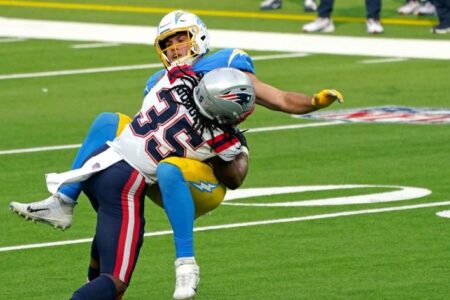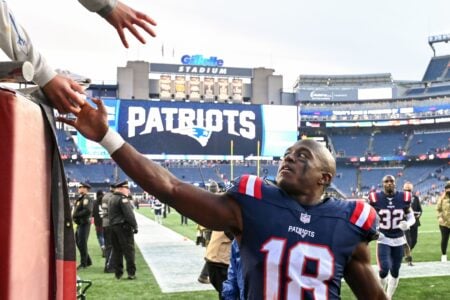What constitutes success is executing when it is required. Passing or running.
Bingo. This team, if it wants to succeed in the playoffs, they have to be able to run when they need to, and pass when they need to. If they can only do one of them, they better be able to do that one thing REALLY well.
Not making defensive stops when they are needed has cost this team when it mattered the most. See 2006, 2007 and 2010.
I think this is not quite true. In 2006, yes. They had a big lead but couldn't hold off Indy. Granted, half the defense had the flu and were playing on an empty tank, but still. They actually made a couple of HUGE defensive stops in the 4th quarter of that game. At 28-28, the Colts got the ball with 11:06 left after a Pats' 3-and-out, but the Pats' D held firm, forcing a 3-and-out of their own.
The Pats then drove for a FG - that was the drive where Reche Caldwell dropped a wide open, easy pass for a TD. Blame the offense for the loss of 4 points there. But still, they got the lead. Then, after the Colts came back to tie it, NE drove for the lead. Indy then got the ball at their 20, down 34-31 with 3:49 remaining. The Pats held, forcing a 3-and-out, and the ensuing punt gave the ball to New England at the Pats' 40 with just 3:22 left in the game.
Now, at this point, given their health (or lack of it), I'd say that the NE defense had done a fairly admirable job. In two huge spots they had forced Indy to punt, and they gave the ball back to the offense in very good field position with just over 3 minutes left *and with the lead* and they gave the Pats' offense the chance to salt the game away.
What did NE do? First play: penalty for 12 men on the field. UNBELIEVABLE. Ok, 1st and 15. Brady completes to Caldwell for 7 yards. 2nd and 8. Manageable. Brady 4 yard pass to Ben Watson. Brings up 3rd and 4. Biggest play of the game. What happens? Incomplete pass to Troy Brown. They punt, Indy drives for the winning score.
In other words, the D gave the O a chance to end the game and the offense did DIDDLY SQUAT with it. And then finally the D gave out. But they did get two huge stops in the 4th quarter and the offense missed a golden chance to salt the game away.
In 2007, the Pats obviously lost to the Giants in the SB, and it was a defensive struggle all game long, 17-14. Until the 4th quarter, the Pats absolutely dominated the Giants' offense, holding them to just 3 points. They got lots of big stops along the way. Obviously they didn't seal the deal with the Giants' last drive, but it's difficult to blame the defense for that game, on the whole. There isn't a Pats' fan alive that wouldn't have taken it if he was told before the game that they'd allow just 17 points to the Giants. We'd ALL have thought that was a relatively easy Pats' win (considering that they just scored 38 on the Giants a few weeks before in NY). While the O made a huge drive late in the game, they only amassed 274 total yards and 14 points. We can be upset at that last Giants' drive (which featured a 4th down conversion made by Jacobs by about the length of your middle finger, an INT that slipped through Samuels' hands, a freakish play aided by the worst non-call on an obvious (and play-impacting) holding I've ever seen...in other words that drive was a perfect storm of unbelievable things), but if the offense plays even semi-decently, they win that game going away.
In 2006 the Pats' D did not play well overall but made a big stop and gave the ball back to the offense to put the game away and the O couldn't do it. In 2007 the D played terrific all game long until the very end.
In 2010, the D played pretty well overall against the Jets (held them to 14 first downs and just 314 total yards), but the Jets got two TD thanks to tremendous field position. The unbelievable gaffe on the fake punt gave the ball to the Jets well into NE territory. And then they scored after the unsuccessful onside kick late in the game. That's 14 points right there that the Jets should *never* have gotten.
When you lose, there's usually enough blame to go around, and so it is in all three of these games. But it's not fair to pin these games on the defense's inability to make stops when it matters most. That's a factor, but hardly the only one.


















